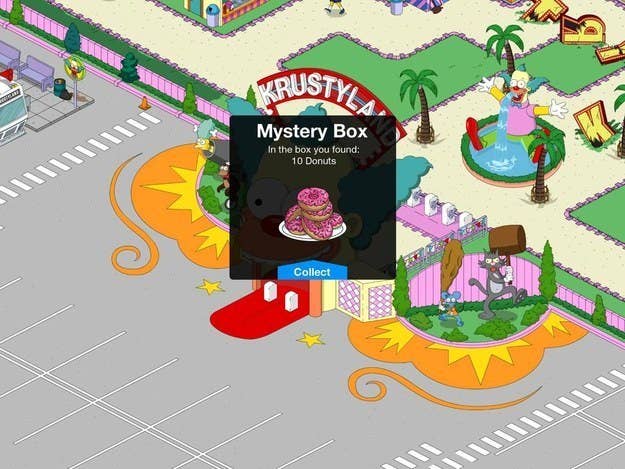
If you are one of the millions of people currently addicted to smartphone games, you've probably come across The Simpsons: Tapped Out. The plot is simple. Springfield has been destroyed by a nuclear meltdown and it's your job to rebuild it. Game play follows the model of Sim City and Civilization.
The formula has proved immensely successful, making it the newest "freemium" game to become a popular sensation among casual gamers. Freemium games, like Candy Crush Saga, Clash of the Clans, and now The Simpsons: Tapped Out, operate on a simple principle. They're free to play, but you have to pay hard cash if you really want to get ahead. Little by little, the game will manipulate you into buying premium features. Hence the portmanteau: "freemium."
For example, in Candy Crush Saga you normally have to wait thirty minutes after running out of lives in order to play again. But, if you're willing to pay a small fee, you can play right away. If you're like me, you'll get hooked, give into the system, and pay the fee.
But what makes The Simpsons: Tapped Out unique in the world of freemium games is that it subjects this system to the self-referential humor that audiences have come to expect from The Simpsons, and in doing so it becomes an almost too perfect example of what Marxist philosopher (and now famous plagiarist) Slavoj Žižek calls "cynical ideology." For Zizek, contemporary ideology no longer attempts to pass itself off as the truth. Instead, it cynically exults in its falseness. I know that this is just ideology, it says, but all the same I will continue as if it were true. I will keep playing.
For example, in a dialogue between Mr. Burns and Lisa released in the most recent update, the game explicitly unveils the methods it uses to psycho-bully the user into paying for premiums features:
Lisa: It's all a trick to give us the illusion of accomplishment. But all they want is money. When we can't feel anything anymore, and we have no choice, we have to pay.Mr. Burns: Think about it. For $60 you can buy a fantastic console game with a hundred million dollar budget that geniuses and artists have worked for years to perfect, giving you hours upon hours of satisfying gameplay. But these so-called freemium strategy games offer you pared-down simplistic gameplay, but because you're so hooked on upgrades, you end up spending hundreds of dollars on premium currency to just get back to normal.Lisa: It's the ultimate scam.Mr. Burns: I wish I'd thought of it.
The game seems to be undermining its own legitimacy by explaining to the user precisely how it has manipulated and will continue to manipulate her into paying for premium currency. And yet, this does anything but discourage us from continuing to play. Knowing that we are being manipulated doesn't make it any easier to escape the cycle of tapping and paying, tapping and paying. If anything, it only makes it harder.
At best, this only invites us to share in the game's cynicism. You might be a dupe of ideology, it tells us, but at least you know that you're a dupe.
And we keep playing.

